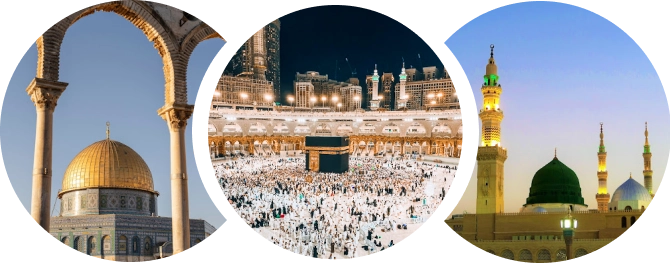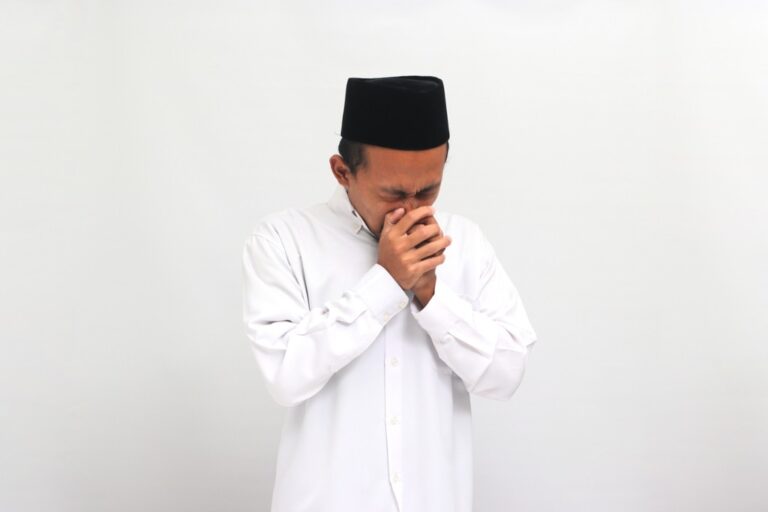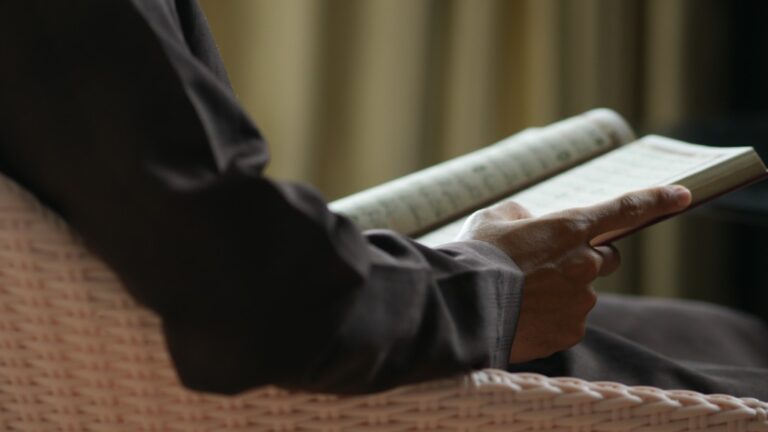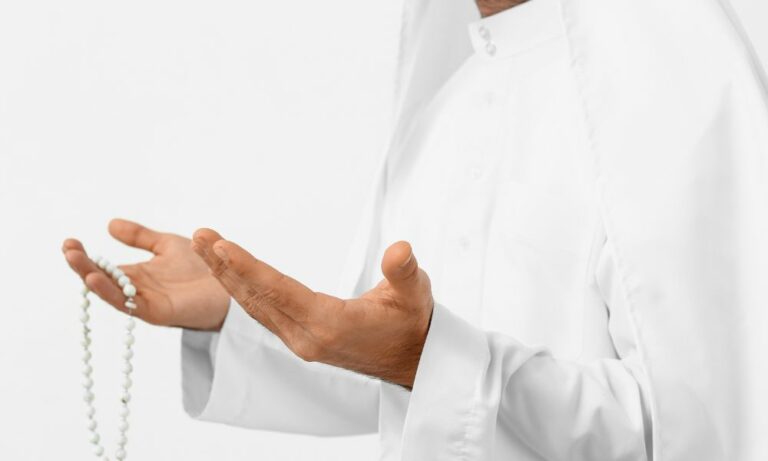Why is Wudu Important?
Have you ever wondered why Muslims perform Wudu before their prayers? The fact is that Wudu, a form of cleansing ritual, holds great significance in Islam and plays an integral role in maintaining both physical and spiritual hygiene.
This article delves into the importance of Wudu from religious and health perspectives. Dive in to unravel how this simple act can benefit your faith and wellness immensely!
Understanding Wudu
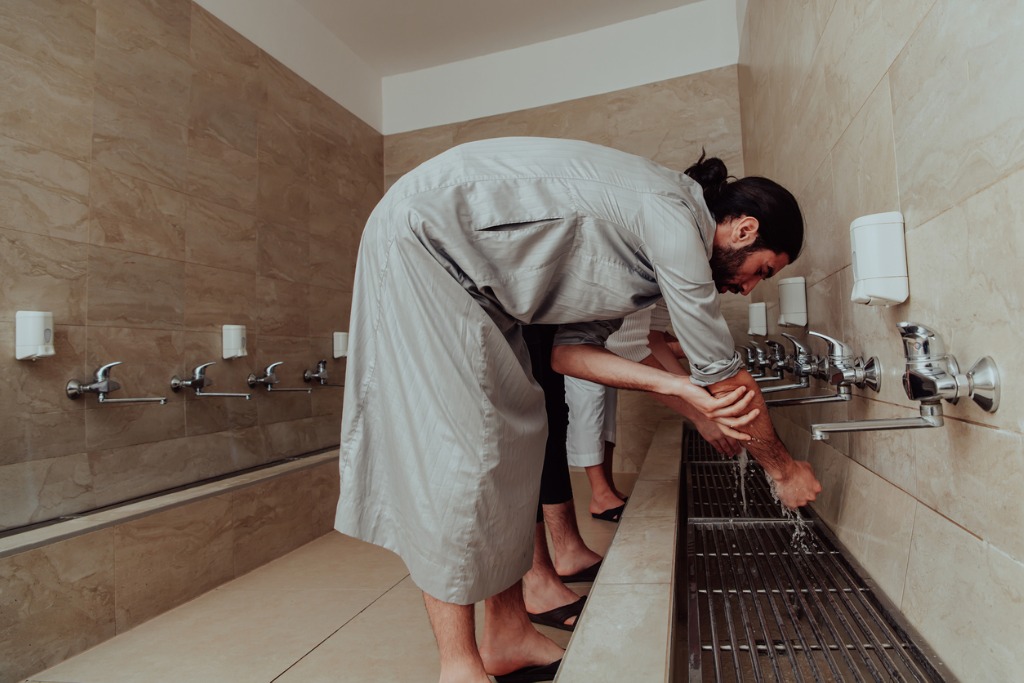

In Islam, Wudu is a ritual purification act essential for maintaining physical and spiritual cleanliness. It entails washing specific body parts with water before performing acts of worship such as Salah.
The practice is governed by Fiqh (Islamic jurisprudence) and follows strict guidelines that dictate its procedures.
Wudu is an act of worship that seeks the pleasure of Allah SWT as well as physical hygiene. The ritual entails washing the face, hands, head, and feet in a specific order.
This hygienic practice is so essential that Prophet Muhammad PBUH said that:
- الطُّهُورُ شَطْرُ الإِيمَانِ
Cleanliness is half of faith Sahih Muslim 223
Certain activities render Wudu invalid; these include urination, defecation, flatulence, deep sleep, and a few other things we will discuss later in the article.
The Basis of Wudu


Wudu is based on Quranic references and descriptions in Hadith. This is explored in detail in the following sections.
Quranic References
The Quran offers several passages highlighting the significance of Wudu.
- One essential reference is in Surah Al-Ma’idah (5:6): “O you who have believed when you rise to [perform] prayer, wash your faces and your forearms to the elbows and wipe over your heads and wash your feet to the ankles…”
- Another enlightening verse comes from Surah An-Nisa (4: 43), which states, “O you who have believed, do not approach prayer while you are intoxicated until you know what you are saying or in a state of janabah (major sexual impurity)…”
- Further emphasizing cleanliness, Surah Al-Baqarah (2:222) says: “Indeed, Allah SWT loves those who are constantly repentant and loves those who purify themselves.”
- Lastly, there’s a reference in Surah Ta-Ha (20: 12) where God told Prophet Moses – “Remove your sandals – indeed, you are in the sacred valley of Tuwa.” This reflects on physical purity as a form of respect when standing on holy ground.
Hadith Descriptions
Hadiths offer vivid descriptions of Wudu, providing a rich source of insight into this Islamic ritual. Let’s delve into some of these details:
- The Prophet Muhammad (PBUH) emphasized the significance of Wudu by saying that cleanliness is half of faith.
الطُّهُورُ شَطْرُ الإِيمَانِ
Cleanliness is half of faith Sahih Muslim 223
- Hadiths describe how the Prophet meticulously performed Wudu before prayers, emphasizing its importance in preparing for acts of worship.
أَنَّ النَّبِيَّ ـ صلى الله عليه وسلم ـ كَانَ يَتَوَضَّأُ لِكُلِّ صَلاَةٍ فَلَمَّا كَانَ يَوْمُ فَتْحِ مَكَّةَ صَلَّى الصَّلَوَاتِ كُلَّهَا بِوُضُوءٍ وَاحِدٍ
The Prophet used to perform ablution for every prayer, but on the day of the conquest of Makkah, he performed all of the prayers with one ablution. Sunan Ibn Majah 510
- The sequence of washing the face and forearms and wiping the head and feet is detailed in multiple hadiths. Sahih al-Bukhari 1934
- Hadiths also provide guidance on what invalidates the Wudu, such as urination, defecation, and sexual intercourse, reaffirming the role of Wudu in maintaining spiritual and physical purity. Sahih Muslim 649i, Sunan Abi Dawud 168
- Practical application and respect for water are clear in Hadith lessons, demonstrating that even when water is abundant, a believer must perform Wudu cautiously to not waste water.
أَنَّ رَسُولَ اللَّهِ ـ صلى الله عليه وسلم ـ مَرَّ بِسَعْدٍ وَهُوَ يَتَوَضَّأُ فَقَالَ ” مَا هَذَا السَّرَفُ ” . فَقَالَ أَفِي الْوُضُوءِ إِسْرَافٌ قَالَ ” نَعَمْ وَإِنْ كُنْتَ عَلَى نَهَرٍ جَارٍ ” .
The Messenger of Allah SWT passed by Sa’d when he was performing ablution, and he said: ‘What is this extravagance?’ He said: ‘Can there be any extravagance in ablution?’ He said: ‘Yes, even if you are on the bank of a flowing river.'” Sunan Ibn Majah 425
Grade: Da’if (Darussalam)
Importance of Wudu


Wudu is essential due to its spiritual and scientific benefits.
Spiritual Benefits
Wudu has several spiritual benefits. It aids in soul purification and seeking Allah SWT’s pleasure. Muslims can strengthen their faith and connect more deeply with their Creator by performing Wudu sincerely and intentionally.
Furthermore, Wudu is thought to be a method of obtaining forgiveness for minor sins. It serves as a reminder to seek repentance and progress spiritually. The practice of Wudu reflects Islam’s strong emphasis on cleanliness and purity.
Scientific and Medical Benefits
Wudu is not only spiritually significant, but also scientifically and medically beneficial.
A study has shown that Wudu can help regulate blood pressure, increase heart activity, boost red blood cell count, enhance circulation, improve oxygen levels, and aid in removing toxins from the body.
Wudu has also been shown to reduce anxiety, promote mental clarity, reduce stress, relieve tension, and contribute to peace.
These scientific and medical advantages highlight the holistic nature of this Islamic act of worship.
Wudu and its Role in Salah


Wudu is an integral part of Salah. Muslims must perform Wudu before formal prayers to achieve ritual purity and spiritual cleanliness.
Muslims prepare physically and spiritually for their connection with Allah SWT during prayer by cleansing specific parts of their bodies with water.
We demonstrate our commitment to seeking closeness to Allah SWT by performing Wudu and approaching Salah with reverence and devotion.
How Prophet Muhammad PBUH Used to Perform Wudu
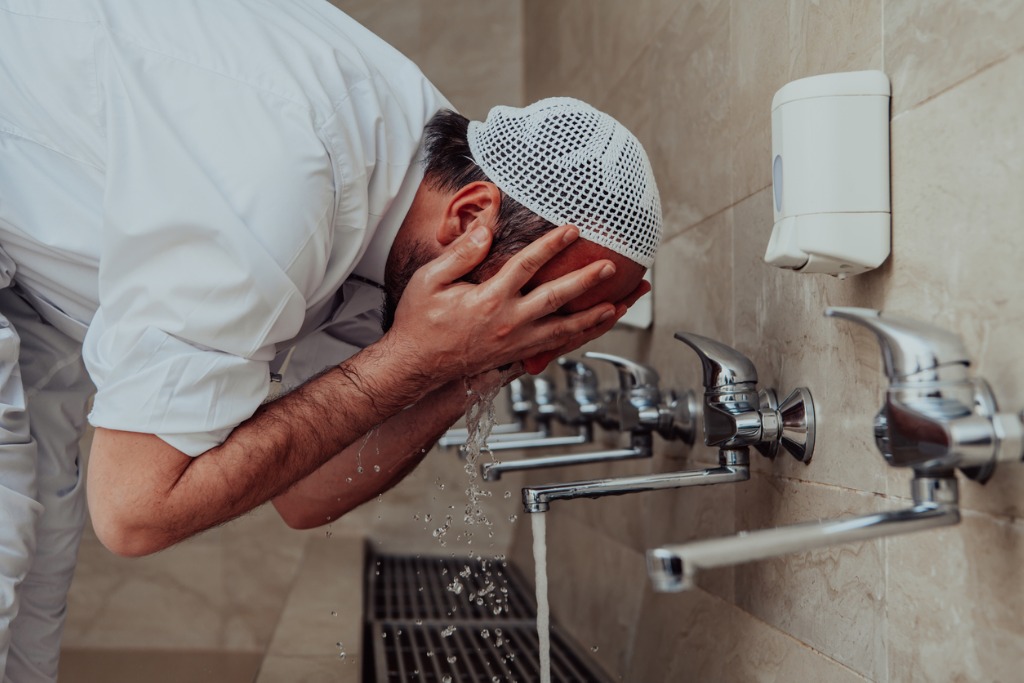

In the following hadith, we learn the detailed steps of Wudu. Uthman bin Affan R.A performed Wudu, and said that he saw Prophet Muhammad PBUH perform it in this manner. This Hadith was narrated by Humran, a freed slave of Uthman ibn Affan.
“I saw `Uthman bin `Affan asking (for a tumbler of water) to perform ablution (and when it was brought), he poured water from it over his hands and washed them thrice and then put his right hand in the water container and rinsed his mouth and washed his nose by putting water in it and then blowing it out. Then he washed his face thrice and (then) forearms up to the elbows thrice, then passed his wet hands over his head, and then washed each foot thrice. After that `Uthman said, “I saw the Prophet (ﷺ) performing ablution like this of mine.”
- Reference: Sahih al-Bukhari 164
Tayammum: An Alternative to Wudu
When water is unavailable or cannot be used, Muslims have another option for performing Wudu. Tayammum is a dry ablution method that uses sand or dust. Tayammum is done by striking the hands-on clean sand or dust and then rubbing them across the face and hands.
It does not require water use and can be performed in situations like illness or travel. Tayammum is valid until the water becomes available or the reasons for performing it cease, giving those unable to perform traditional Wudu flexibility.
Health Benefits of Wudu Through Comparison of Nasal-Cavity Bacterial-Content


One important health benefit of Wudu is reducing nasal-cavity bacterial content, contributing to overall health and well-being.
A study focused on the importance of nasal hygiene, especially within Islamic ablution (a cleansing ritual before prayer). Nasal inhalation, using saline solution or water, was examined for its role in maintaining nasal health and preventing infections.
The researchers worked with 15 healthy Taif residents who all practiced regular ablution and prayer. They discovered that both saline solution inhalation and ablution significantly reduced nasal bacterial content, emphasizing the importance of ablution for personal hygiene and health, mainly when saline solution is not readily available. Ablution was also helpful in the reduction of harmful bacteria that can cause infections.
In essence, this study emphasizes the importance of ablution in Islam for nasal cleanliness and infection prevention. It implies that adhering to the Islamic practice of Wudu five times a day can have health benefits for everyone, regardless of religious affiliation.
Conclusion
In Islam, Wudu is extremely important for both spiritual and physical reasons. It is a method of seeking Allah SWT’s pleasure and purifying oneself before engaging in ritual prayers.
This practice can also provide scientific and medical benefits, demonstrating its relevance beyond religious obligations. Muslims can strengthen their connection with Allah SWT while promoting cleanliness and hygiene in their daily lives by performing Wudu with sincerity and understanding its significance.
FAQs
Why is Wudu important in Islam?
Wudu is significant in Islam because it is a physical and spiritual act of purification performed before performing acts of worship such as prayer. It purifies the body and soul, representing purity and readiness to connect with Allah SWT.
What are the benefits of performing Wudu?
Wudu has several benefits, including cleansing the body of impurities, improving hygiene practices, increasing mindfulness and focus during prayer, promoting inner peace and tranquility, and strengthening the connection between an individual and their Creator.
How does Wudu contribute to spiritual growth?
Wudu promotes spiritual development by instilling humility, gratitude, discipline, and mindfulness. It serves as a reminder to maintain purity in life’s physical and spiritual aspects.
Can someone perform Wudu without water?
An alternative method to Wudu is called Tayammum. It can be performed using clean earth/soil in situations where water is not readily available, or using it may cause harm or hardship (such as illness or lack of access).
ما أهمية الوضوء؟
هل تساءلت يومًا لماذا يتوضأ المسلمون قبل صلواتهم؟ والحقيقة هي أن الوضوء، وهو شكل من أشكال طقوس التطهير، له أهمية كبيرة في الإسلام ويلعب دورًا أساسيًا في الحفاظ على النظافة الجسدية والروحية.
تتناول هذه المقالة أهمية الوضوء من الناحيتين الدينية والصحية. اكتشف كيف يمكن لهذا الفعل البسيط أن يفيد إيمانك وعافيتك بشكل كبير!
فهم الوضوء


في الإسلام، الوضوء هو طقوس تطهير ضرورية للحفاظ على النظافة الجسدية والروحية. وهو يشمل غسل أجزاء معينة من الجسم بالماء قبل أداء العبادات مثل الصلاة.
تخضع هذه الممارسة للفقه (الفقه الإسلامي) وتتبع إرشادات صارمة تملي إجراءاتها.
الوضوء هو عبادة تسعى إلى رضاء الله سبحانه وتعالى وكذلك النظافة الجسدية. وتشتمل الطقوس على غسل الوجه واليدين والرأس والقدمين بترتيب معين.
إن ممارسة النظافة هذه ضرورية جدًا لدرجة أن النبي محمد صلى الله عليه وسلم قال:
- الطُّهُورُ شَطْرُ الإِيمَانِ
النظافة نصف الإيمان صحيح مسلم 223
بعض الأنشطة تجعل الوضوء غير صالح؛ وتشمل هذه الأمور التبول، والتغوط، وانتفاخ البطن، والنوم العميق، وبعض الأشياء الأخرى التي سنناقشها لاحقًا في المقالة.
أساس الوضوء


يعتمد الوضوء على المراجع القرآنية وأوصاف الحديث. سيتم استكشاف ذلك بالتفصيل في الأقسام التالية.
المراجع القرآنية
يقدم القرآن عدة آيات تسلط الضوء على أهمية الوضوء.
- أحد المراجع الأساسية موجود في سورة المائدة (5:6): "يا أيها الذين قد آمنوا إذا قمتم إلى الصلاة فاغسلوا وجوهكم وأيديكم إلى المرافق وامسحوا برؤوسكم وأرجلكم إلى الكعبين..."
- وتأتي آية أخرى من سورة النساء (4: 43)، والتي تنص على "يا أيها الناس أيها الذين آمنوا لا تقربوا الصلاة وأنتم سكارى حتى تعلموا ما تقولون أو جنباً..."
- وللتأكيد على النظافة أكثر، تقول سورة البقرة (2:222): "إن الله سبحانه وتعالى يحب" التائبون على الدوام ويحبون المتطهرين."
- أخيرًا، هناك إشارة في سورة طه (20: 12) حيث قال الله لموسى: "اخرجوا". نعليك إنك بالوادي المقدس طوى". وهذا ينعكس على الطهارة الجسدية كنوع من الاحترام عند الوقوف على الأرض المقدسة.
أوصاف الأحاديث
تقدم الأحاديث وصفًا حيًا للوضوء، مما يوفر مصدرًا غنيًا للتعرف على هذه الطقوس الإسلامية. دعونا نتعمق في بعض هذه التفاصيل:
- أكد النبي محمد (صلى الله عليه وسلم) على أهمية الوضوء بقوله أن النظافة نصف الإيمان.
الطُّهُورُ شَطْرُ الإِيمَانِ
النظافة نصف الإيمان صحيح مسلم 223
- تصف الأحاديث كيف كان النبي يتوضأ بدقة قبل الصلاة، مع التأكيد على أهميته في الاستعداد للعبادة.
أَنَّ النَّبِيَّ ـ صلى الله عليه وسلم ـ كَانَ يَتَوَضَّأُ لِكُلِّ صَلاَةٍ فَلَمَّا كَانَ يَوْمُ فَتْحِ مَكَّةَ صَلَّى الصَّلَوَاتِ كُلَّهَا بِوُضُوءٍ وَاحِدٍ
كان النبي صلى الله عليه وسلم يتوضأ لكل صلاة، ولكن يوم فتح مكة صلى الصلوات بوضوء واحد. سنن ابن ماجه 510
- وتسلسل غسل الوجه والذراعين ومسح الرأس والقدمين مفصل في أحاديث متعددة. صحيح البخاري 1934
- تقدم الأحاديث أيضًا إرشادات حول ما يبطل الوضوء، مثل التبول والتغوط والجماع، مما يؤكد من جديد دور الوضوء في الحفاظ على الطهارة الروحية والجسدية. صحيح مسلم 649ط، سنن أبي داود 168 أ>
- التطبيق العملي واحترام الماء واضحان في دروس الحديث، مما يدل على أنه حتى عندما يكون الماء وفيرًا، يجب على المؤمن أن يتوضأ بحذر حتى لا يهدر الماء.
أَنَّ رَسُولَ اللَّهِ ـ صلى الله عليه وسلم ـ مَرَّ بِسَعْدٍ وَهُوَ يَتَوَضَّأُ فَقَالَ " مَا هَذَا السَّرَفُ ". فَقَالَ أَفِي الْوُضُوءِ إِسْرَافٌ قَالَ " نَعَمْ وَإِنْ كُنْتَ عَلَى نَهَرٍ جارٍ " .
مر رسول الله صلى الله عليه وسلم بسعد وهو يتوضأ فقال: ما هذا الإسراف؟ قال: فهل في الوضوء إسراف؟ قال: نعم، ولو كنت على ضفة نهر جار.
الدرجة: ضعيف (دار السلام)
أهمية الوضوء


الوضوء ضروري لما له من فوائد روحية وعلمية.
الفوائد الروحية
للوضوء فوائد روحية عديدة. يساعد على تطهير النفس وطلب رضوان الله سبحانه وتعالى. يمكن للمسلمين تقوية إيمانهم والتواصل بشكل أعمق مع خالقهم من خلال أداء الوضوء بإخلاص وعمد.
علاوة على ذلك، يُعتقد أن الوضوء هو وسيلة للحصول على مغفرة الذنوب الصغيرة. إنه بمثابة تذكير لطلب التوبة والتقدم روحياً. تعكس ممارسة الوضوء تركيز الإسلام القوي على النظافة والطهارة.
الفوائد العلمية والطبية
الوضوء ليس له أهمية روحية فحسب، بل هو مفيد علميًا وطبيًا أيضًا.
أ أثبتت الدراسات أن الوضوء يمكن أن يساعد في تنظيم ضغط الدم، وزيادة نشاط القلب، وزيادة عدد خلايا الدم الحمراء، وتعزيز الدورة الدموية، وتحسين مستويات الأكسجين، والمساعدة في إزالة السموم من الجسم.
كما ثبت أن الوضوء يقلل من القلق، ويعزز الوضوح العقلي، ويقلل من التوتر، ويخفف التوتر، ويساهم في السلام.
تسلط هذه المزايا العلمية والطبية الضوء على الطبيعة الشمولية لهذه العبادة الإسلامية.
الوضوء ودوره في الصلاة


الوضوء جزء لا يتجزأ من الصلاة. يجب على المسلمين أداء الوضوء قبل الصلاة الرسمية لتحقيق الطهارة والنظافة الروحية.
يستعد المسلمون جسديًا وروحيًا للاتصال بالله سبحانه وتعالى أثناء الصلاة عن طريق تطهير أجزاء معينة من أجسادهم بالماء.
نحن نظهر التزامنا بالتقرب إلى الله سبحانه وتعالى من خلال الوضوء والصلاة بخشوع وإخلاص.
كيف كان النبي محمد صلى الله عليه وسلم يتوضأ


وفي الحديث التالي نتعرف على خطوات الوضوء التفصيلية. وتوضأ عثمان بن عفان رضي الله عنه، وقال: رأيت النبي محمد صلى الله عليه وسلم يتوضأ هكذا. وهذا الحديث رواه حمران مولى عثمان بن عفان.
"رأيت عثمان بن عفان يطلب (في قدح) يتوضأ (فلما أتي به) صب على يديه من الماء فغسلهما" ثلاثاً، ثم أدخل يده اليمنى في الإناء، فتمضمض، واستنشق، ثم استنثر، ثم غسل وجهه ثلاثاً، وذراعيه إلى المرفقين ثلاثاً، ثم مضى ويضع يديه على رأسه، ثم يغسل كل رجل ثلاثا، فقال عثمان بعد ذلك: رأيت النبي صلى الله عليه وسلم توضأ مثل وضوئي هذا.
- المرجع: صحيح البخاري 164
التيمم: بديل للوضوء
عندما لا يتوفر الماء أو لا يمكن استخدامه، يكون لدى المسلمين خيار آخر لأداء الوضوء. التيمم هو طريقة الوضوء الجاف التي تستخدم الرمل أو الغبار. ويتم التيمم بضرب الرمل أو الغبار النظيف باليدين ثم فركهما على الوجه واليدين.
لا تتطلب استخدام الماء ويمكن إجراؤها في حالات مثل المرض أو السفر. التيمم صالح حتى يتوفر الماء أو تنتهي أسباب أدائه، مما يمنح غير القادرين على أداء الوضوء التقليدي مرونة.
الفوائد الصحية للوضوء من خلال مقارنة محتوى البكتيريا في تجويف الأنف


إحدى الفوائد الصحية المهمة للوضوء هي تقليل التهابات الأنف المحتوى البكتيري في التجويف، مما يساهم في الصحة العامة والرفاهية.
A دراسة ركزت على أهمية نظافة الأنف، خاصة في الوضوء الإسلامي (طقوس التطهير قبل الصلاة). وتم فحص الاستنشاق الأنفي بالمحلول الملحي أو الماء لمعرفة دوره في الحفاظ على صحة الأنف والوقاية من الالتهابات.
عمل الباحثون مع 15 من سكان الطائف الأصحاء الذين مارسوا الوضوء والصلاة بانتظام. واكتشفوا أن استنشاق المحلول الملحي والوضوء يقللان بشكل كبير من محتوى البكتيريا الأنفية، مما يؤكد أهمية الوضوء للنظافة الشخصية والصحة، خاصة عندما لا يكون المحلول الملحي متاحًا بسهولة. وكان الوضوء مفيداً أيضاً في تقليل البكتيريا الضارة التي يمكن أن تسبب الالتهابات.
في جوهرها، تؤكد هذه الدراسة على أهمية الوضوء في الإسلام لنظافة الأنف والوقاية من العدوى. وهذا يعني أن الالتزام بالممارسة الإسلامية للوضوء خمس مرات في اليوم يمكن أن يكون له فوائد صحية للجميع، بغض النظر عن الانتماء الديني.
الاستنتاج
في الإسلام الوضوء مهم للغاية لأسباب روحية وجسدية. وهي طريقة لطلب مرضاة الله سبحانه وتعالى وتطهير النفس قبل أداء الصلاة.
يمكن أن توفر هذه الممارسة أيضًا فوائد علمية وطبية، مما يدل على أهميتها بما يتجاوز الالتزامات الدينية. يمكن للمسلمين تقوية علاقتهم بالله سبحانه وتعالى مع تعزيز النظافة في حياتهم اليومية من خلال أداء الوضوء بإخلاص وفهم أهميته.
الأسئلة الشائعة
ما سبب أهمية الوضوء في الإسلام؟
الوضوء مهم في الإسلام لأنه عمل تطهير جسدي وروحي يتم إجراؤه قبل أداء العبادات مثل الصلاة. فهو ينقي الجسد والروح، ويمثل النقاء والاستعداد للاتصال بالله سبحانه وتعالى.
ما هي فوائد الوضوء؟
للوضوء فوائد عديدة، منها تطهير الجسم من الشوائب، وتحسين ممارسات النظافة، وزيادة اليقظة والتركيز أثناء الصلاة، وتعزيز السلام والطمأنينة الداخلية، وتقوية الاتصال بين الفرد و خالقهم.
كيف يساهم الوضوء في النمو الروحي؟
يعزز الوضوء التطور الروحي من خلال غرس التواضع والامتنان والانضباط واليقظة. إنه بمثابة تذكير للحفاظ على النقاء في جوانب الحياة الجسدية والروحية.
هل يمكن للإنسان أن يتوضأ بدون ماء؟
هناك طريقة بديلة للوضوء تسمى التيمم. يمكن إجراؤها باستخدام الأرض/التربة النظيفة في المواقف التي لا تتوفر فيها المياه بسهولة، أو قد يؤدي استخدامها إلى ضرر أو مشقة (مثل المرض أو عدم إمكانية الوصول).

